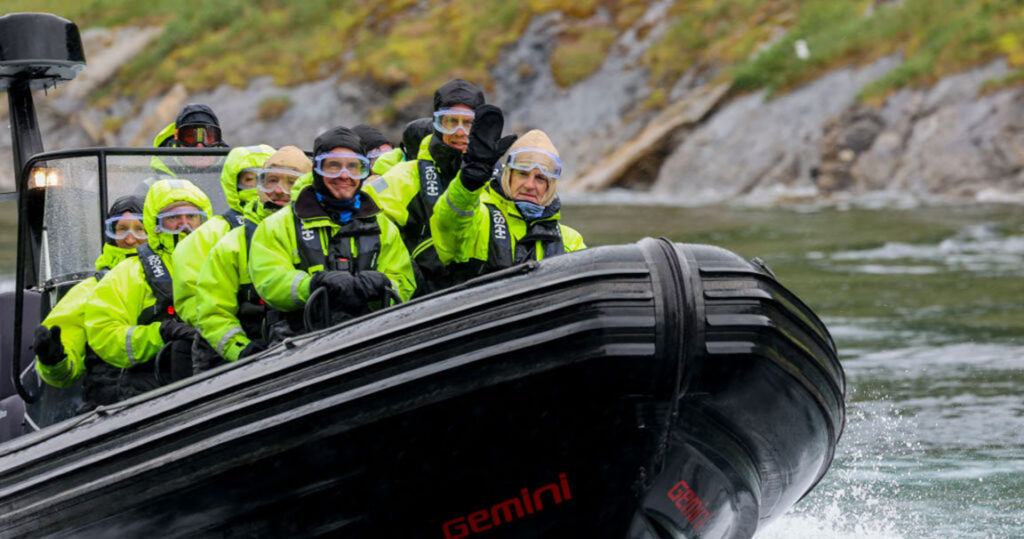Norwegian Prime Minister Jonas Gahr Støre (front right), Swedish Prime Minister Ulf Kristersson and Finnish President Alexander Stubb tour on a rigid inflatable boat from Bodø harbor to Saltstraumen, Norway, on June 20, 2024. AFP/GETTY IMAGES
THE WATCH STAFF
The leaders of three Scandinavian countries met in Norway’s Arctic territory in June 2024 to discuss the budding mutual defense relationship among Finland, Norway and Sweden and the increasing instability caused by Russia’s 2022 invasion of Ukraine. The June 19 to June 20 summit was held at Norway’s Bodø military complex, which was recently upgraded and consolidated to become Norway’s pulse point for its entire Armed Forces.
In addition to Prime Ministers Jonas Gahr Støre of Norway, Ulf Kristersson of Sweden and Finland’s President Alexander Stubb, the countries’ defense ministers also attended. The meeting began with Gahr Støre receiving Kristersson and Stubb on the Norwegian Coast Guard vessel KV Svalbard, docked at Bodø harbor. The group also toured on a rigid inflatable boat from Bodø harbor to Saltstraumen, a small strait known for some of the strongest currents in the world, according to the Barents Observer, a Norwegian newspaper. The leaders also visited the Norwegian Armed Forces headquarters in Reitan, just outside Bodø.
Recent events have pushed the Nordic countries into the closest military cooperation in centuries, abandoning decades of Cold War neutrality after the war began in Ukraine. Russian President Vladimir Putin has publicly threatened retaliation for Sweden and Finland joining NATO in the past two years. Since then, a mysterious Hong Kong-registered, Russian-linked ship apparently dragged its anchor in the Baltic Sea, damaging communication and gas pipelines between Finland, Sweden and Estonia. While the October 2023 investigation concerning the cable cuttings has not been formally concluded, Finnish authorities have said the sabotage was the work of Russia to punish it for joining NATO, a charge Russia has denied. Shortly after, hundreds of unauthorized migrants, mainly from Africa and Asia, were shuttled to the Finnish border, an action Finnish authorities framed as a deliberate hybrid warfare strategy to destabilize a country with the largest land frontier with Russia. Finland closed its land border with Russia shortly after and recently announced the closure would be extended indefinitely.
Recently, a large civilian fleet of Russian ships in the North Sea was found to be spying on Norwegian infrastructure. A joint investigation by the Follow the Money website and the Belgian newspaper De Tijd found that Russia has expanded the number of its fishing boats, cargo ships, oil tankers, research vessels and pleasure yachts that are suspected of working to gather intelligence on the location of critical infrastructure and pipelines in the North Sea to potentially sabotage or disrupt them, Newsweek reported in June 2024. And Russia has essentially exited the Arctic Council, a body made up of the eight nations with Arctic territory. Norway has attempted to keep diplomatic ties open with Russia, especially in the Arctic, but that effort has met with mixed results.
For Finnish President Stubb, the Bodø meeting was useful. “With Finland and Sweden now members of NATO, the Alliance will have to rethink the defence of the entire Northern European region. As a new member state, we have a lot to learn from Norway,” Stubb said in a statement released from his office shortly after the summit concluded. The security situation in the region and the link between the Baltic Sea and the Arctic were discussed, Stubb said. “If the Baltic Sea was blocked, Sweden and Norway would be an alternative route for Finland. We discussed a lot about infrastructure, logistics and their development in the Nordic region.”

